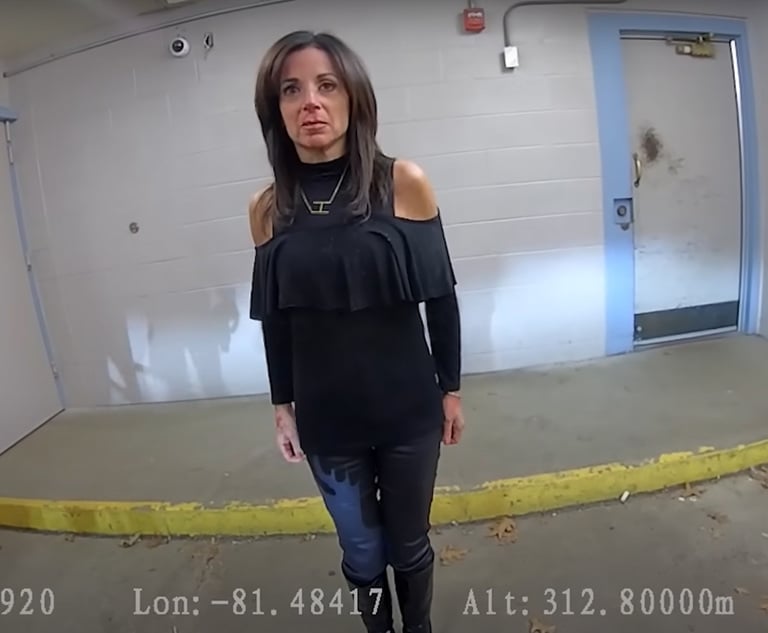 Eleventh Circuit Judge William Pryor Jr. discusses the U.S. Supreme Court, his path to the bench and other topics at a Federalist Society DC Young Lawyers Chapter event on July 16, 2015. Photo by Zoe Tillman/THE NATIONAL LAW JOURNAL.
Eleventh Circuit Judge William Pryor Jr. discusses the U.S. Supreme Court, his path to the bench and other topics at a Federalist Society DC Young Lawyers Chapter event on July 16, 2015. Photo by Zoe Tillman/THE NATIONAL LAW JOURNAL.Employment Bar Shaken by Ruling That Restricts Age Bias Protections
Days after it came down, the employment bar is still dissecting a complicated en banc ruling from the U.S. Court of Appeals for the Eleventh Circuit that says older job applicants can't bring discrimination suits based on a theory of disparate impact.
October 12, 2016 at 03:04 PM
6 minute read
Days after the decision, the employment bar is still dissecting a complicated en banc ruling from the U.S. Court of Appeals for the Eleventh Circuit that says older job applicants can't bring discrimination suits based on a theory of disparate impact.
In a fractured full bench decision, the court held, seemingly for the first time, that the key provision of the federal age discrimination law applies only to a company's employees and not to individuals who apply for job openings. The decision is a game changer within the Eleventh Circuit states of Alabama, Florida and Georgia and has some lawyers calling for Supreme Court review.
The majority opinion written by Judge William Pryor, rejected a potential mass action lawsuit against R.J. Reynolds Tobacco Co. over a hiring policy that allegedly gave preference to applicants with two to three years of job experience out of college and disfavored those with closer to a decade in the workforce. The company's guidelines provided to its hiring contractor, according to the ruling, said the greener group of workers “adjusts easily to changes.”
The decision sparked a vigorous dissent from Judge Beverly Martin and shocked lawyers who represent workers in discrimination claims. Companies can just put up a sign: “Those over 40 need not apply,” said veteran employment and civil rights lawyer Lee Parks of Parks, Chesin & Walbert of Atlanta. “It's a sad decision,” he said, adding he doesn't expect it to stand.
The question before the court was whether the Age Discrimination in Employment Act of 1967 allows a rejected job applicant to sue over a practice that has a disparate impact on older workers. Pryor was joined at least partially by seven other judges in holding that the disparate impact provision, unlike other pieces of the law, does not protect applicants, only employees.
The 76-page decision went deep into the tenets of statutory construction, parsing a provision that makes it “unlawful for an employer … to limit, segregate, or classify his employees in any way which would deprive or tend to deprive any individual of employment opportunities or otherwise adversely affect his status as an employee, because of such individual's age.”
Pryor, joined by Chief Judge Ed Carnes and Judges Gerald Tjoflat, Frank Hull, Stanley Marcus and Julie Carnes, focused on the phrase beginning “or otherwise,” deeming it a “catchall” that limits the section's reach. Judges Adalberto Jordan and Robin Rosembaum agreed with that part of the decision.
In a dissent joined by Judges Jill Pryor and Charles Wilson, Martin wrote that, if the majority is right, then the Equal Employment Opportunity Commission and all other courts in the country have been wrong for 49 years.
She said the law protects two categories of individuals—those adversely affected in their employment as well as those deprived of employment opportunities. Martin pointed to the phrase “any individual” and said it was safe to assume Congress meant what it said. Plus, she wrote, an “individual” who can't get a job because of age is unlawfully denied any “status as an employee.”
“This perfectly natural reading is the one the EEOC has always used,” wrote Martin, who authored a panel opinion in the case in 2015 which called the statute's language ambiguous and deferred to the agency interpretation.
Writing separately, Rosenbaum addressed the dilemma and rebuked the EEOC for adopting what she called a flawed interpretation of the statute.
“This case is challenging,” she wrote, “because despite the clarity of the statutory language, the agency charged with administering the statute has, for nearly the past 50 years—through both Republican and Democrat administrations—consistently construed it in a way that conflicts with what appears to me to be the objectively indisputable meaning of the statutory language. That fact gives me serious pause.”
Martin took her colleagues to task on a second point, as well. The majority ruled that Richard Villarreal, the named plaintiff, waited too long to sue after RJR first rejected him in 2007 at the age of 49. Villarreal didn't take action until 2010, when a law firm contacted him and suggested R.J. Reynolds had discriminated against him because of his age. Villarreal then made five more applications for employment—all rejected—before lodging a complaint with the EEOC.
Martin argued that Villarreal had no way to know about the company's private preference for younger workers and his claims should not be time-barred. “The majority now tells us that secret discrimination won't be punished unless the victim tried to expose the discrimination himself, even if he had no reason to suspect anyone was discriminating against him,” Martin wrote.
The legal team representing Villarreal and others similarly situated is considering asking the U.S. Supreme Court to review the decision, according to one of the attorneys, John Almond of Rogers & Hardin in Atlanta. The team includes Berger & Montague in Philadelphia and two firms in San Francisco, Altshuler Berzon and Schneider Wallace Cottrell Brayton Konecky.
“We're just now in the process of coming to grips with the decision and procedural status,” Almond said Tuesday. “I think it's fair to say this isn't the last step in this case.”
R.J. Reynolds' defense team at Jones Day in Atlanta and Washington, D.C., did not respond to a request for comment.
The company has backing from the U.S. Chamber of Commerce, which argued that Congress intended to limit the protections afforded to older job applicants “because age is different than the other classifications protected from employment discrimination.” The chamber went on to argue that unlike other protected groups, older people had not faced a lifetime of discrimination. “Older workers today were younger workers yesterday.”
Georgia State University Law School Dean Steven Kaminshine, who teaches labor and employment law, agreed with Pryor's finding of an imperfection in the statute. But he suggested the hair-splitting debate over word meanings missed the big picture. “Personally, I think the court should have gone further and determined whether the outcome was rational and reasonable,” he said.
Harvard University law professor Noah Feldman panned the decision in a Bloomberg article headlined, “Subtle Age Discrimination Gets a Court's Blessing.” He urged the U.S. Supreme Court to take the case and “fix the bad literalism.”
Until then, Feldman concluded, “disparate impact age discrimination can flourish in the 11th Circuit.”
Katheryn Hayes Tucker can be reached at [email protected]. On Twitter: @KatherynHTucker
This content has been archived. It is available through our partners, LexisNexis® and Bloomberg Law.
To view this content, please continue to their sites.
Not a Lexis Subscriber?
Subscribe Now
Not a Bloomberg Law Subscriber?
Subscribe Now
NOT FOR REPRINT
© 2024 ALM Global, LLC, All Rights Reserved. Request academic re-use from www.copyright.com. All other uses, submit a request to [email protected]. For more information visit Asset & Logo Licensing.
You Might Like
View All
In Lawsuit, Ex-Google Employee Says Company’s Layoffs Targeted Parents and Others on Leave
6 minute read
‘A Force of Nature’: Littler Mendelson Shareholder Michael Lotito Dies At 76
3 minute read
Former Cleveland Meteorologist Sues TV Station for Alcohol Use Disorder Discrimination Claims

Employers Scramble to Get Immigration Records in Order Ahead of Trump Crackdown
6 minute readTrending Stories
- 1Former McCarter & English Associate Fired Over 'Gangsta Rap' LinkedIn Post Sues Over Discrimination, Retaliation
- 2First-of-Its-Kind Parkinson’s Patch at Center of Fight Over FDA Approval of Generic Version
- 3The end of the 'Rust' criminal case against Alec Baldwin may unlock a civil lawsuit
- 4Solana Labs Co-Founder Allegedly Pocketed Ex-Wife’s ‘Millions of Dollars’ of Crypto Gains
- 5What We Heard From Litigation Leaders This Year
Who Got The Work
Michael G. Bongiorno, Andrew Scott Dulberg and Elizabeth E. Driscoll from Wilmer Cutler Pickering Hale and Dorr have stepped in to represent Symbotic Inc., an A.I.-enabled technology platform that focuses on increasing supply chain efficiency, and other defendants in a pending shareholder derivative lawsuit. The case, filed Oct. 2 in Massachusetts District Court by the Brown Law Firm on behalf of Stephen Austen, accuses certain officers and directors of misleading investors in regard to Symbotic's potential for margin growth by failing to disclose that the company was not equipped to timely deploy its systems or manage expenses through project delays. The case, assigned to U.S. District Judge Nathaniel M. Gorton, is 1:24-cv-12522, Austen v. Cohen et al.
Who Got The Work
Edmund Polubinski and Marie Killmond of Davis Polk & Wardwell have entered appearances for data platform software development company MongoDB and other defendants in a pending shareholder derivative lawsuit. The action, filed Oct. 7 in New York Southern District Court by the Brown Law Firm, accuses the company's directors and/or officers of falsely expressing confidence in the company’s restructuring of its sales incentive plan and downplaying the severity of decreases in its upfront commitments. The case is 1:24-cv-07594, Roy v. Ittycheria et al.
Who Got The Work
Amy O. Bruchs and Kurt F. Ellison of Michael Best & Friedrich have entered appearances for Epic Systems Corp. in a pending employment discrimination lawsuit. The suit was filed Sept. 7 in Wisconsin Western District Court by Levine Eisberner LLC and Siri & Glimstad on behalf of a project manager who claims that he was wrongfully terminated after applying for a religious exemption to the defendant's COVID-19 vaccine mandate. The case, assigned to U.S. Magistrate Judge Anita Marie Boor, is 3:24-cv-00630, Secker, Nathan v. Epic Systems Corporation.
Who Got The Work
David X. Sullivan, Thomas J. Finn and Gregory A. Hall from McCarter & English have entered appearances for Sunrun Installation Services in a pending civil rights lawsuit. The complaint was filed Sept. 4 in Connecticut District Court by attorney Robert M. Berke on behalf of former employee George Edward Steins, who was arrested and charged with employing an unregistered home improvement salesperson. The complaint alleges that had Sunrun informed the Connecticut Department of Consumer Protection that the plaintiff's employment had ended in 2017 and that he no longer held Sunrun's home improvement contractor license, he would not have been hit with charges, which were dismissed in May 2024. The case, assigned to U.S. District Judge Jeffrey A. Meyer, is 3:24-cv-01423, Steins v. Sunrun, Inc. et al.
Who Got The Work
Greenberg Traurig shareholder Joshua L. Raskin has entered an appearance for boohoo.com UK Ltd. in a pending patent infringement lawsuit. The suit, filed Sept. 3 in Texas Eastern District Court by Rozier Hardt McDonough on behalf of Alto Dynamics, asserts five patents related to an online shopping platform. The case, assigned to U.S. District Judge Rodney Gilstrap, is 2:24-cv-00719, Alto Dynamics, LLC v. boohoo.com UK Limited.
Featured Firms
Law Offices of Gary Martin Hays & Associates, P.C.
(470) 294-1674
Law Offices of Mark E. Salomone
(857) 444-6468
Smith & Hassler
(713) 739-1250








